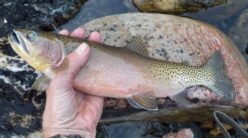"In hunting, the finding and killing of the game is after all a part of the whole. The free self reliant adventurous life, with its rugged and stalwart democracy; the wild surroundings, the grand beauty of the scenery, the chance to study the ways and habits of the wood-land creatures — all these unite to give to the career of the wilderness hunter its particular charm. The chase is the best of all national pastimes; it cultivates that vigorous manliness for the lack of which in a nation as in an individual, the possession of no other qualities can possibly atone."
-President Theodore Roosevelt
The hunter is as free as it is possible to be in this technocratic world in which we live. The hunter is able to project himself out and beyond himself, to be fully absorbed in a quieter, deeper and older world.
President Theodore Roosevelt was an avid hunter and hunted not only in this country, but in other countries as well. He was particularly fond of hunting in Africa, and the Rocky Mountains of the United states.
I often read his writing concerning hunting as well as those of other hunters who have written about their hunting adventures. Most of these men and women had a very deep reverence for all animals they hunted. I can't think of one of these hunters who didn't believe that the meat from game animals should be processed and used for their own use or who gave the meat to others such as friends or a "Hunting for the Hungry" type organization.
The idea of killing an animal and just taking the head, antlers, horns or racks as a trophy and then wasting the meat runs counter to the hunter's ethic. I believe it violates the principles of wildlife conservation that I was taught from an early age, even before I was given a rifle and taught to hunt.
It is true that I have hunted jackrabbits to preserve the crops of farmers from being destroyed between Blackfoot and Arco, while others have participated in jackrabbit drives. I have used a rifle and shotgun to protect my family's horses from predators, but I think I can justify those activities according to the hunter's ethic.
When it comes to eating what we hunt, it seems hunters have known all along what others are just beginning to realize. Wild game meat is healthier than domestically raised cattle, pork and chicken.
Wild meat is free of chemicals and pesticides. Game animals roam as they please and eat healthier feed.
Bruce Watkins at Purdue University found that wild elk, deer and antelope from the Rocky Mountain region have greater amounts of Omega-3 fatty acids and a lower and therefore healthier ratio of Omega-6 to Omega-3 in muscle meats compared to grain-fed beef. This fatty acid ratio is also consistent with the recent American Heart Association recommendation to increase the consumption of Omega-3 fatty acids in order to reduce the risk of cardiovascular disease.
So, it would seem that hunters had it right all along. It just took awhile for science to catch up to what hunters were already were doing.
Smokey Merkley was raised in Idaho and has been hunting since he was 10 years old. He was a member of the faculty of Texas A&M University for 25 years. There he taught orienteering, marksmanship, self-defense, fencing, scuba diving and boxing. He was among the first DPS-certified Texas Concealed Handgun Instructors. He can be contacted at mokeydo41245@hotmail.com.



